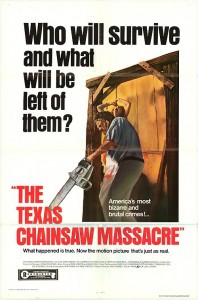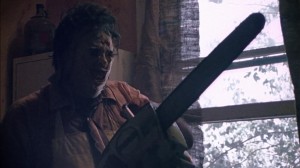THE TEXAS CHAINSAW MASSACRE
By Raymond Knowby
In the wee bellbottom clad year of nineteen hundred and seventy four, young Tobe Hooper, a paranoid Texan along with a handful of close beer buddies, made this brutal and brutally low budget thriller and used the popular Ed Gein theme which had already inspired PSYCHO to new devestating effects.
 As we’re told in the effective “made you think this is real” scrolling text and narration, Sally Hardesty, her invalid brother Franklin, and their friends have taken an idyllic afternoon summer drive. The film opens with a radio broadcast about grave robbings and some truly disturbing photoflash stills of corpses in varying stages of decay, just before panning back to show us the gruesome monument of a headstone adorned with human remains. After the opening credits, we meet our innocent young five protagonists, and see them heading to the cemetary of the alleged crimes to check on the grave of a loved one. What follows their invistigation there is the surprise pick up of a nutbag hitchhiker (Edwin Neal) who single handedly terrorizes the group before they kick him to the curb, only to then stop at a gas station run by a nervous old redneck (Jim Seidow) for refueling. Though he shadily warns them not to continue on with a planned visit to an abandoned family home nearby, they choose to ignore his advice and soon disappear into a twisted backwoods nightmare of hellish porportions.
As we’re told in the effective “made you think this is real” scrolling text and narration, Sally Hardesty, her invalid brother Franklin, and their friends have taken an idyllic afternoon summer drive. The film opens with a radio broadcast about grave robbings and some truly disturbing photoflash stills of corpses in varying stages of decay, just before panning back to show us the gruesome monument of a headstone adorned with human remains. After the opening credits, we meet our innocent young five protagonists, and see them heading to the cemetary of the alleged crimes to check on the grave of a loved one. What follows their invistigation there is the surprise pick up of a nutbag hitchhiker (Edwin Neal) who single handedly terrorizes the group before they kick him to the curb, only to then stop at a gas station run by a nervous old redneck (Jim Seidow) for refueling. Though he shadily warns them not to continue on with a planned visit to an abandoned family home nearby, they choose to ignore his advice and soon disappear into a twisted backwoods nightmare of hellish porportions.
The film scares you on a different level than you would anticipate, as it reaches into your subconscious and strangleholds the most primitive fears about strangers and what they do in the inbred and lawless wildnerness of rural America. It also shows very little in the way of actual grue, with the blade of the titular chainsaw only connecting to flesh once onscreen for the entire running length. Rather, with the low budget 16mm blown to 35mm grit and the unusual documentary-styled structure, it smartly forces you to feel the horror instead of bludgeoning you with it visually. Disturbed and blackly comedic, there isn’t anything else quite like it in the annuals of popular exploitation cinema.
